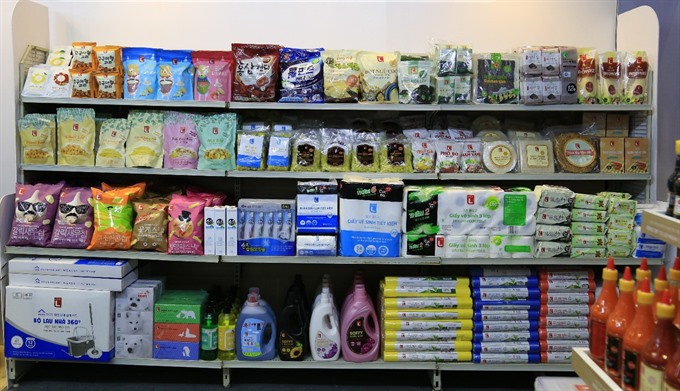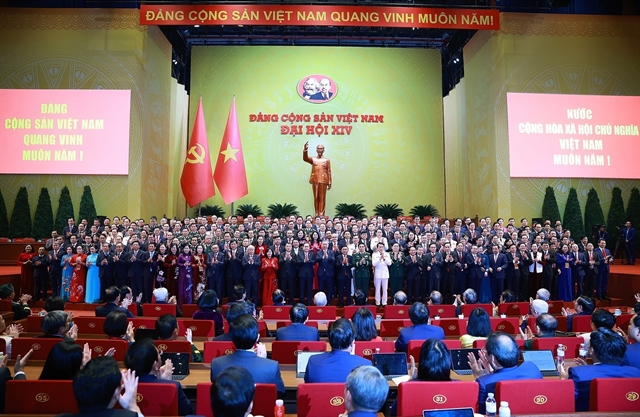 Economy
Economy

From the many cooking oils on a shelf at Co.opmart Đinh Tiên Hoàng supermarket, Nguyễn Thanh Trúc of District 1 has picked a 2l bottle of Co.opmart soya cooking oil.
 |
| LOTTE Mart’s private label products. — VNS Photo |
HCM CITY — From the many cooking oils on a shelf at Co.opmart Đinh Tiên Hoàng supermarket, Nguyễn Thanh Trúc of District 1 has picked a 2l bottle of Co.opmart soya cooking oil.
“I started using this cooking oil a few months ago, and saw its quality was ok while its price is good compared to other products,” she says.
In her trolley are also some other Co.opmart-label products such as box tissues and a floor cleaning liquid.
A research by Kantar Worldpanel Vietnam showed that 39 per cent of Vietnamese shoppers at modern outlets prefer private-label products.
The top 10 common products are toilet paper, box tissues, table napkins, loose leaf teas, floor cleaners, liquid detergents, frozen foods, dishwashing liquids, detergent powders and cooking oils, it said.
According to industry experts, the development of private-label products is an inevitable trend.
Developing such products benefits consumers, retailers and manufacturers, they said. Consumers can get quality products at lower prices, retailers can offer more choices and thus retain customers, while manufacturers earn more from making these products.
After developing private labels since 2007, Saigon Co.op, the country’s leading retailer, now has nearly 3,000 products, including essential products, household utensils, students’ uniforms, office fashion, rice paper and others.
Development potential
Võ Hoàng Anh, private-label director at Saigon Co.op, said: “There is huge potential for private-label development in Việt Nam. Consumers are growing fond of private-label products since they are quality products at good prices.”
Through development of private-label products, Saigon Co.op wants to attract and retain customers better, he said.
“With its advantages of having the largest retail market share in fast moving consumer goods in the country, a diversified retail model, and understanding of consumers’ needs, we have a clear product development direction when co-operating with manufacturers in making private-label products."
The co-operation would help the manufacturers fully utilise their production capacity, promote their brands to consumers since their information is also available on the packaging as well as in Saigon Co.op’s promotions, he said.
“So we want manufacturers to have peace of mind when producing products based on Saigon Co.op standards.”
Many foreign retailers such as LOTTE Mart too have private-label products manufactured by enterprises in Việt Nam not only for selling in the domestic market but also to export to other markets.
Đoàn Diệp Bình, head of PR and events at LOTTE Mart Vietnam, said the supermarket started to develop private-label products over a year ago and has more than 1,000 of them.
“In 2017 LOTTE also exported to Myanmar and Laos nearly VNĐ2 billion (US$88,105) worth of Choice L private-label products, including foodstuff, consumer goods, household plastics.”
Kantar Worldpanel’s research also found that private labels are still limited in Việt Nam, accounting for a mere 2.4 per cent of sales at supermarkets compared to 20-30 per cent in the US and EU.
The low rate is mainly due to the underdeveloped modern trade channel, lack of a diverse range of products and poor communication, it said.
However, with the strong development of modern retail channel, the market for private label products is projected to grow further, according to experts.
Bình said: “The LOTTE private-label products are meant to increase choices for customers, so [we] choose to invest slowly but surely. We will expand certain private-label products, with a focus on essential food items serving consumers’ daily needs.”
Anh said: “Saigon Co.op would continue looking for capable partners with the same sense of purpose to develop specific featured products to bring a better shopping experience to customers coming to shop at our retail systems.”
According to Lê Thanh Lâm, deputy general director of Saigon Food JSC, a company that makes private-label products for supermarkets and has a contract to supply nearly 50 dishes to 7-Eleven convenience stores, there is a steady outlet for private-label products.
Thanks to that, her company has been able to optimise the capacity utilisation of machinery, equipment and factories besides saving distribution costs. — VNS




